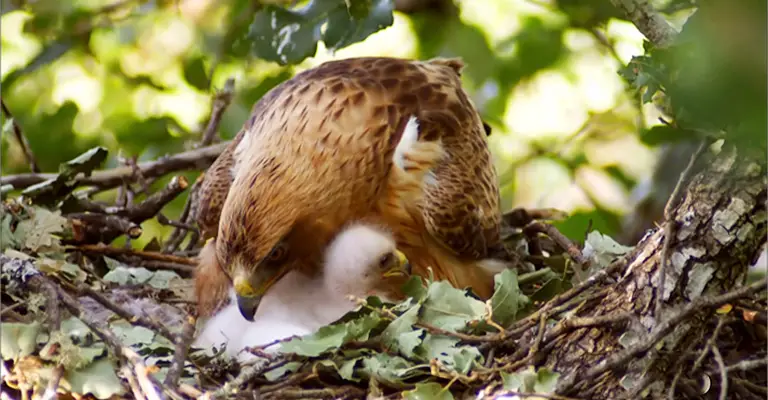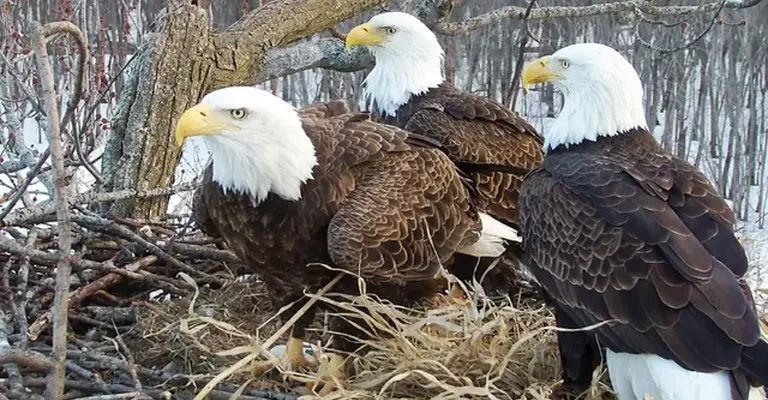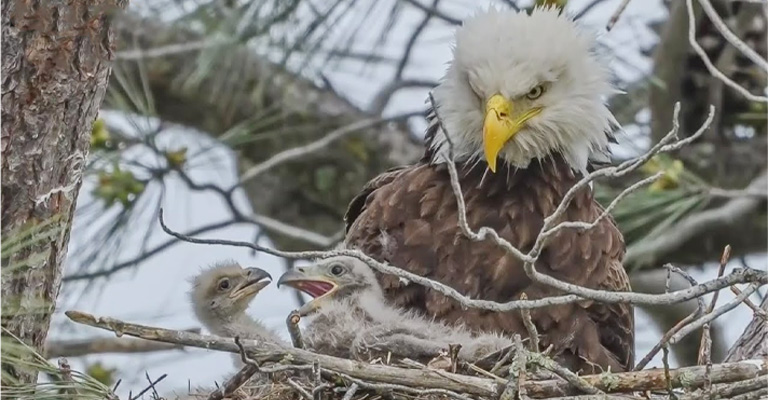Earlier, we had a definitive guide on how eagles mate and bring up their children.
After successful fledging, the young ones leave their parents at 10 to 12 weeks and start their own life. But, they don’t completely leave their parents for another 1-2 months.
During this time, they stay around and learn from their parents how to fly and hunt. They develop their skills fully and then go far away to live their life.
So, what happens after they meet after years? Do eagles recognize their offspring? If you haven’t thought about it yet, this question must have raised an interest in you.
We are here to fill you up. Today we will explore another interesting fact on the eagles. We will learn how intelligent they are or do they simply forget and move on? Let’s begin.

Do You Know?
- The eaglets are initially blind when they hatch, with their eyes closed. It takes about a week for their eyes to open, and they rely on their parents for everything during this period.
- The eggs don’t all hatch at the same time. The first chick to hatch often has an advantage in terms of size and strength. It can sometimes lead to sibling rivalry.
- They grow incredibly fast. Within a few weeks, they can go from small, fluffy chicks nearly to the size of their parents.
- The survival rate for young eagles is relatively low in the first year. However, those who make it past a year have a good chance of living up to 20-30 years or more.
- Once they leave the nest, young eagles can travel long distances in search of their territory, and some even migrate over long distances.
Do Eagles Recognize Their Offspring?
The answer is remarkably Yes! Eagles are intelligent birds. Both parents build their nest carefully and protect their family for a time.
They invest a significant amount of time in raising the offspring. During this time, they feed them, keep them warm, and protect them from any harm. And teach them the secret of life.
Hence, they develop a strong bond with their young ones. If it still confuses you, the next part will clear your doubts when you learn about their cycle and parental behavior.
Eagles & Their Parental Care

As mentioned earlier, eagles are highly devotees! They raise their children with significant care and protection.
Both the parents build the nest to prepare a safe and well-protected shelter for the babies. They divide the roles beautifully. The male eagle generally brings the materials and the female one sets them in place.
The mother incubates the eggs after laying. The role of a father starts beforehand. He hunts and provides food for both the female and the eaglets.
They must complete the roles significantly. As the eaglets grow up fast, they need food repeatedly during this time. It depends on how both parents play their roles to nourish the young ones.
Thus, they leave a footprint behind and know very well how the eaglets sound and vary from other birds.
Do Eagles Recognize Their Offspring?

Many people take it differently! How’s this even possible to remember the eaglets when they grow up? They are animals and not as intelligent as us, right?
Eagles may not be the most intelligent animals on earth, but they surely are as smart as be! The eaglets leave behind specific cues and develop special voice tones and behaviors. How can parents forget that?
Keep in mind that, eagles generally tame for a lifetime, meaning they would stay with the same partner for a life to come unless one of them dies. It is only then, that they look for new partners.
Adult eagles reveal a deep sense of care and affection. Research suggests that eagles can differentiate between their eaglets and those of other birds, at least to some extent.
It’s the attention to the eaglets that are responsible for it. Even in a crowded nest where multiple eaglets live together, they can still separately recognize each one of them later.
How Do Eagles Communicate with Each Other?
It’s important to note that eagles don’t depend on facial features or postures like some mammals.
They communicate with sounds. They have different needs and each of the needs has a specific tone of voice. For example, the bald eagle delivers astoundingly weak calls, made of a series of high-pitched notes during copulation.
Parents often remember the tone of the children and how they sound. It is enough for them to remember their children.
Do Eagles Ever Mate With Their Offspring?
It has not been yet possible to document whether close inbreeding takes place in eagles or not.
It’s really not an easy job for any bird experts to observe and document such occurrences in the wild. To prove such events, it’s a matter of a long time and you have to observe a couple and their offspring throughout their life cycle.
And, the entire life tree would take 20-30 years to complete its circle of life.
It’s quite impossible in the wild as you have to track the children and the parents and observe how they behave. However, even if you think of conducting such research, it would be easier in a close research facility rather than wide in the open.
However, experts believe after years of research that, such occurrence of close inbreeding is rare and nearly not possible.
In Summary,
Eagles are the mighty creatures of our planet. They are the prime hunters and they feed on other birds and animals to satisfy their daily needs.
In between, they have a really delicate life underway that serves perfectly for their family. You can say they are beautifully emotional creatures that take care of their family sincerely.
They would attack and prevent anyone from harming their family even if they have to fight hard! Stay with us, our discussion on eagles hasn’t finished yet!
We will soon come back with another interesting topic on eagles! Meanwhile, if you like our article, please share it with your friends and it will help us grow!